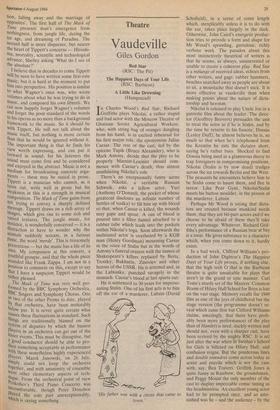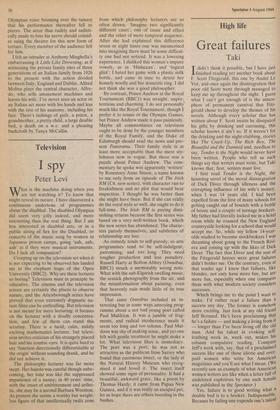Theatre
Vaudeville
Giles Gordon
Red Star (RSC: The Pit) The Happiest Days of Your Life (RSC: Barbican) A Little Like Drowning (Hampstead)
In Charles Wood's Red Star, Richard Griffiths plays Nikolai, a rather stupid and bad actor with the Moscow Theatre of Glorious Soviet Agricultural Workers, who, with string bag of oranges dangling from his hand, is in excited rehearsal for his first major role, the eponymous Julius Caesar. The rest of the cast, led by the epicene Tupik (Bruce Alexander), who is Mark Antony, decide that the play to be properly Marxist-Leninist should com- mence with Caesar's death, thus almost annihilating Nikolai's role.
There's an exceptionally funny scene when Nikolai, a veritable Russian Schweik, asks a fellow actor, Yuri (Anthony O'Donnell, the pocket of whose greatcoat discloses an infinite number of bottles of vodka) to fill him up with blood so that, when Caesar is killed, the wounds may gape and spout. A can of blood is poured into a filter funnel attached to a rubber tube which leads into the pockets within Nikolai's toga. Soon afterwards the inebriated actor is overheard by a KGB man (Henry Goodman) mourning Caesar in the voice of Stalin but in the words of Antony's funeral oration with the names of Shakespeare's killers replaced by Beria, Trotsky, Bukharin, Zinoviev and other heroes of the USSR. He is arrested and, in the Lubianka, punched savagely in the stomach. Caesar's blood at last spurts out.
He is sentenced to 30 years for imperso- nating Stalin. One of his first acts is to bite off the ear of a murderer, Lubzin (David was with a circus that came to town.'
Schofield), in a scene of some length which, inexplicably unless it is to do with the ear, takes place largely in the dark. Otherwise, John Caird's energetic produc- tion tries to provide a form and shape for Mr Wood's sprawling, garrulous, richly verbose work. The paradox about this most instinctively theatrical of writers is that he seems, as always, uninterested or unable to create a coherent play. Red Star is a mélange of received ideas, echoes from other writers, and gags: rubber hammers, benches snatched away as people are about to sit, a moustache that doesn't stick. It is more effective as vaudeville than when making points about the nature of dicta- torship and heroism.
Nikolai is released to play Uncle Joe in a patriotic film about the leader. The direc- tor (Geoffrey Beevers) persuades the unit to treat the actor as if he is Stalin, and by the time he returns to his fiancée, Doosia (Lesley Duff), he almost believes he is, so much so that when he's telephoned from the Kremlin he cuts the dictator short, saying he's rather busy. Shocked to find Doosia being used as a glamorous decoy to trap foreigners in compromising positions, Nikolai (Stalin is by now dead) trudges across the ice towards Berlin and the West. The peasants he encounters believe him to be Stalin come to haunt them, and flee in terror. Like Peer Gynt, Nikolai/Stalin meets his button moulder, in the person of the murderer, Lubzin.
Perhaps Mr Wood is saying that dicta- tors are created because mankind needs them, that they are bit-part actors and if we choose to be afraid of them they'll take every advantage. Whatever, Richard Grif- fiths's performance of a Russian bear at bay is a treat. He gives substance to a character which, when you come down to it, hardly exists.
In a bad week, Clifford Williams's pro- duction of John Dighton's The Happiest Days of Your Life proves, if nothing else, that the high tech 0 that is the Barbican theatre is quite unsuitable for plays that aren't in the grand or epic manner. Carl Toms's sturdy set of the Masters' Common Room of Hilary Hall School for Boys is lost on the vast stage. Memory recalls the 1949 film as one of the joys of childhood but the stage version (the programme doesn't re- veal which came first but Clifford Williams claims, amazingly, that there have prob- ably been more performances of the play than of Hamlet) is tired, slackly written and should not, even with a sharper cast, have been revived by the mighty RSC. It is set just after the war when St Swithin's School for Girls is billeted on Hilary Hall, and confusion reigns. But the ponderous lines and double entendres come across today as sexist and puerile which is not the case with, say, Ben Travers. Griffith Jones is quite funny as Rainbow, the groundsman, and Peggy Mount the only member of the cast to display impeccable comic timing as the headmistress. An excellent young actor had to be prompted once, and so asto- nished was he – and the audience – by the Olympian voice booming over the tannoy that his performance thereafter fell to pieces. The actor thus rudely and sadisti- cally made to lose his nerve should consid- er suing the theatre for this new form of torture. Every member of the audience felt for him.
I felt an intruder at Anthony Minghella's embarrassing A Little Like Drowning, as if witnessing the private family rites of three generations of an Italian family from 1926 to the present with the action divided between Italy, England and Dublin. Alfred Molina plays the central character, Alfre- do, who sells amusement machines and leaves his wife. I've never seen an actor or an Italian act more with his hands and less with the rest of his anatomy, including his face. There's lashings of guilt, a priest, a grandmother, a pretty child, a large double bed, a death on a w.c. and a pleasing backcloth by Tanya McCallin.







































 Previous page
Previous page